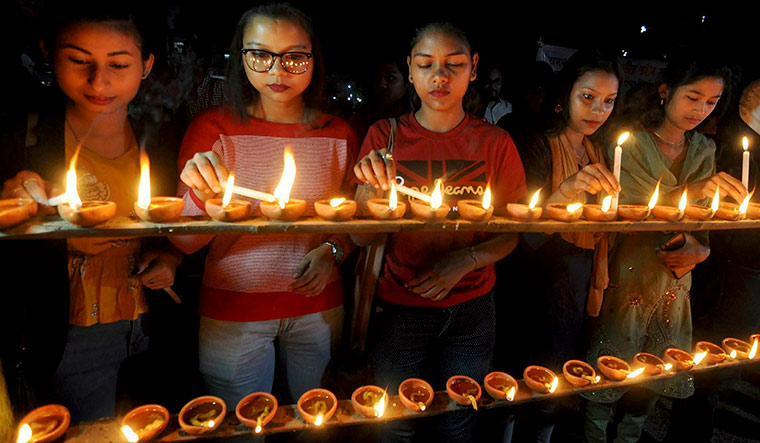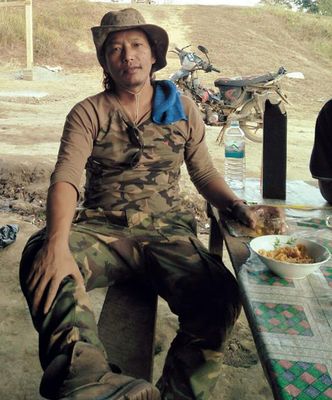The entire northeast heaved a sigh of relief on February 13 when the Rajya Sabha was adjourned sine die, causing the Citizenship (Amendment) Bill, 2016 to lapse. The region was in turmoil after the Lok Sabha cleared the bill on January 8. Even most of the BJP chief ministers from the northeast—N. Biren Singh of Manipur, Pema Khandu of Arunachal Pradesh and Sarbananda Sonowal of Assam—were against the controversial bill.
The protests against the bill took place at a time when the Myanmar army was engaged in an operation to flush out northeast insurgents operating from its soil. The border regions of Myanmar have been a safe haven for several northeast militant groups. The Bangladesh-Myanmar border, for instance, has been a base for the United Liberation Front of Assam (Independence), while Naga militants are present in large numbers near the border with Arunachal Pradesh and Nagaland. On the Mizoram border, there has been a massive concentration of anti-Rohingya militants.
The Myanmar army intensified the operation after India issued a stern warning last October. India toughened its stance after ULFA struck in Tinsukia in Assam, killing six Bengali workers and abducting dozens. India was also worried about Assamese and Naga youth joining insurgent groups such as ULFA and the National Socialist Council of Nagaland (Khaplang). "After the attacks in Tinsukia, India warned Myanmar that it would act and finish off the terrorist camps," said Pallav Bhattacharya, who retired recently as director-general of intelligence, Assam Police. "ULFA camps were heavily concentrated near the Bangladesh-Myanmar border as Assam did not share a border with Myanmar. So, it was difficult for India to dismantle all of them. After our warning, Myanmar finally acted." Had the warning went unheeded, Bhattacharya claimed India would have launched surgical strikes like it did four years ago.
Even after the 2015 surgical strikes inside Myanmar, as many as 88 insurgent camps, belonging largely to the NSCN(K), continued to operate along the 1600km-long India-Myanmar border. India has been wary after the NSCN(K) and ULFA stepped up their activities in the last two years. Prime Minister Narendra Modi and National Security Adviser Ajit Doval visited Myanmar and asked the country's leadership to take decisive steps to flush out terrorists. Last October, ULFA commander-in-chief Paresh Baruah told THE WEEK in an exclusive interview that India had given Myanmar a blank cheque and that Myanmar was acting on India's whims.
The Myanmar army started by engineering a split in the NSCN(K) into an Indian faction and a Myanmarese faction. It forced the Indian faction out of the outfit's headquarters in Myanmar's Sangin province. The Myanmar faction declared allegiance to the state of Myanmar and gave up its territorial demands. The Indian faction, which was led by Khango Konyak, tried to negotiate with the Myanmar government for permission to stay back in the country. But the ULFA attack in Tinsukia and the complications which developed from the Citizenship Bill foreclosed any such opportunity.
In January, the Myanmar army attacked and overran nearly 25 camps along the border. U Kyaw Wan Sein, a central committee member of the Myanmarese NSCN (K), said it was a bloodless action. “We withdrew troops and let the Myanmar army take over camps in order not to disrupt the peace process." Six battalions of his faction relocated to an undisclosed place. Konyak and his men subsequently moved to India and surrendered before the Army. The leaders of the group then headed to Delhi for talks with the Central government’s Naga interlocutor R.N. Ravi. From Delhi, they returned to Dimapur where they are being held in a specially-designated camp.
Isak Sumi, who heads the militant wing of the Indian faction of the NSCN(K), told THE WEEK, "We have decided to come to the negotiating table. We stayed in Delhi for some time and now we are in Dimapur. The framework for talks is being drawn up." Sumi, implicated in several murder and blast cases, is on the most-wanted list of the National Investigation Agency. He was behind the 2015 attack on the Army's Dogra regiment in which 18 jawans lost their lives. The NSCN(K) is lobbying hard with the Indian government to drop the charges against him, but the Army is unwilling to let him go.
With the Konyak faction opting for negotiations, hundreds of its armed cadres are expected to give up fighting. Said a surrendered NSCN(K) leader, "All Indian cadre will now join the peace talks. No one would agree with the Myanmarese faction, which signed an accord with the Myanmar government, giving up the demand for a separate Naga country. We fought a bloody war for decades for a Naga country. Now, all is lost."
The split in the NSCN(K) is seen as a major success for India, but the same tactics have not yet worked with ULFA(I). After their camps were dismantled, ULFA cadres moved to the Manipur-Myanmar border. Senior leaders of the group fled to Ruili, a Chinese province bordering Myanmar, where Baruah is stationed. Bhattacharya said China was the safest option for the militants.
According to a recent report by the Assam Police, the fleeing ULFA cadres have sought the support of a joint front of the United National Liberation Front of Western South East Asia, a united front of armed separatist groups in the northeast, and CorCom, an umbrella group of insurgents operating on the Myanmar-Manipur border. The report, accessed by THE WEEK, said the Assam Police had alerted law enforcement agencies in the region about possible infiltration by ULFA cadres from the border regions of Manipur and Nagaland. "The report was sent after the operation flush out in Myanmar started. We have proof that the Citizenship Bill has given them ammunition to create disturbance in the northeast," said a senior police officer. He said the insurgent groups had influenced the recent agitation. H.C. Nath, inspector-general (intelligence) of the Assam Police, too, said the insurgent groups were using the bill to foment trouble. "We are investigating their attempts to instigate the civil society to launch protests against the bill,” he said.
The situation remains grave in Manipur. As the Citizenship Bill issue snowballed into a major controversy, insurgents incited civil society groups across the state to resort to violent protests. Boycotts and violent protests returned to the streets of Imphal after a gap of nearly a decade. Modi realised the danger and did not push for the bill to be passed in the Rajya Sabha.
The BJP may, however, try to derive political mileage out of the issue by blaming parties opposed to the bill, branding them anti-Hindu. If the party returns to power in Delhi, it is expected to give Myanmar one more year to expel Indian insurgents. A fresh wave of surgical strikes is quite likely if it fails to do so.




